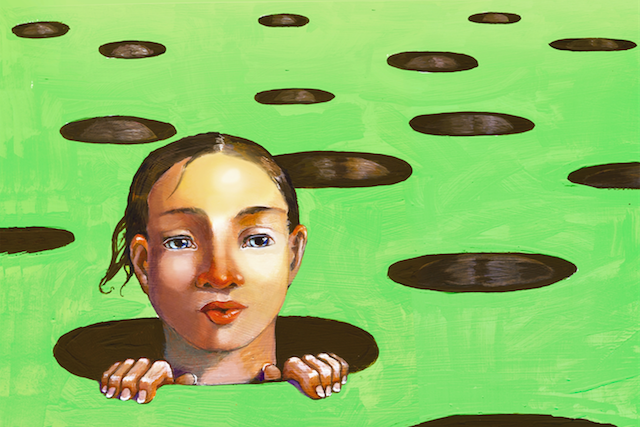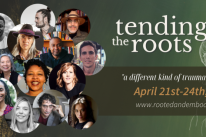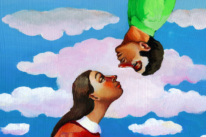
If you asked me when I was younger what I wanted to be when I grew up, I may have answered perfect, or famous, which is incredibly ironic. I simultaneously craved a spotlight while fearing what it might reveal—my inadequacies, my weaknesses, my flaws.
I thought being perfect meant being beyond reproach—undeniably lovable and worthy of respect, something I didn’t always receive growing up.
And I assumed that if I were perfect in all ways, I could finally relax and enjoy my life because I could trust that no one would judge or hurt me. I could navigate the world secure in the knowledge I was good enough, and everyone knew it, so I had nothing to prove.
Though I spent years trying to overcome all my weaknesses—my anxiety, my insecurity, my controlling nature, my need to be liked—I’ve never arrived at a place of complete freedom from these struggles. I’ve made progress, sure, but I’m still flawed. I’m still craggy and cracked, like a mirror that’s been shattered and glued together many times over.
I started thinking about this recently when listening to the sixth episode of Next Creator Up, the podcast I’ve been producing with Ehren Prudhel, the show’s host and my partner in many things.
In this interview, Hollywood screenwriter and author Noah Knox Marshall talked a little about his non-dystopian sci-fi book series for kids and how strong characters have flaws. That’s what makes them real—their quirks, their struggles, their insecurities, and rough edges—because this is what it means to be human.
When we see a flawed character in a movie or a book, we instinctively empathize with them and root for their happiness and success. We know they’re neurotic or needy or scornful or scared, but we care about them anyway and sit at the edge of our seats hoping they get the job, get the girl, or at least get the message they need to grow and thrive.
We see ourselves in these characters, and we want for them the peace and happiness we may deny ourselves.
The irony is we deny ourselves peace and happiness for the very same reason we want it for them—because we’re undeniably and permanently imperfect, and always have something new to work on, no matter how much we learn and grow.
There was a time when I resisted this reality. I truly believed I could eventually reach a point when I did everything “right.” When I always said the right thing, did the right thing, and responded in the right way when other people triggered or challenged me.
When I struggled to do these things, my shame was palpable, and I wanted to hide.
But I’m done hiding now, because I realize flaws don’t just make strong characters—they also make strong people.
We’re not weak for having challenges and shortcomings; we’re strong for facing them, owning them, working on them, and doing our best every day in spite of them.
So if you’re feeling ashamed of your flaws, stop and remind yourself…
1. Everyone has flaws.
You could meet every human being who has ever lived and ever will and would still not encounter a perfect person. To have a pulse means to have imperfections, some developed over time, some we’re born with.
We’re all “wired for struggle,” as Brené Brown wrote, and most, a lot like Augusten Burroughs, “entirely made of flaws, stitched together with good intentions.”
Your specific combination of flaws may seem unique to you, but they’re not. The world is full of people who hurt like you, think like you, fear like you, fall like you, and are just as worthy and lovable, with all their shortcomings and struggles.
2. If someone had been through what you’ve been through they’d likely have the same flaws.
I find this incredibly comforting to consider—that a lot of my personality “flaws” make perfect sense in the context of my history. I may struggle with anxiety and insecurity, but so do most people who’ve been bullied and abused. I may be a control freak, but that’s common among people who’ve felt controlled.
My flaws aren’t statements about who I am as a person; they’re reflections of my path. And many who’d taken that same path would have developed the exact same set of weaknesses and challenges. Which means people without my issues aren’t “better” than me; they just struggle differently because they haven’t been where I’ve been.
3. Flaws connect us.
We often think we need to hide our rough edges, as if they guarantee rejection, but the opposite is usually true: Our flaws connect us. They make us relatable and approachable. They give us common ground.
Think about the people who you most enjoy being around. Odds are, you’re at ease around them because they’re at ease with themselves, in all their imperfect glory. They own their battles and their baggage, they flaunt their quirks like badges of honor, and they know that they have nothing to hide or prove—or at least they act that way.
For years I was uncomfortable and repressed around other people because I was always trying to be who I thought they wanted me to be, because I wanted to be liked. It was as if I’d shoved all my quirks and flaws in a box that I then tried to balance on my head as I walked, stiff and awkward, through the world around me.
Unsurprisingly, this backfired because no one could love me when they didn’t really know me. And no one could relate to me when I hid all my depth under the shallow veil of perfection.
We connect with the truth of being human, not the lie of being perfect.
4. Flaws make us interesting.
A while back Ehren and I took a short drawing class at Disneyland’s animation academy. With a teacher’s instruction, we each drew Jack Skellington, from the movie The Nightmare Before Christmas.
My Jack had a perfectly round head, perfectly round eyes, and a perfectly symmetrical bow tie, which I appreciated at first. Until I saw Ehren’s. His head was ill shaped, his eyes were a little large, and his bow tie was wider than I would have drawn it—and yet it looked so much cooler. It had personality, and it was uniquely Ehren’s. It wasn’t perfect, but it was more interesting.
I think we’re all like that drawing—all the more appealing because of our imperfect parts.
“Perfection,” or the illusion of it, is incredibly boring. It’s predictable, one-dimensional, devoid of heart, uniqueness, and charm. It’s our idiosyncrasies that draw people to us and make them curious about us—where we’ve been, what’s shaped us, what drives us.
5. Flaws can make us better people.
When we own our flaws—when we accept ourselves in all our imperfection instead of judging ourselves for our weaknesses and struggles—we then develop the capacity to offer this same grace to other people.
Conversely, when we judge ourselves harshly, we’re likely to judge other people who reflect back to us the things we don’t like about ourselves. I know I’ve been there before. For example, I’ve seen someone who appeared needy at a time when I felt insecure—and insecure about being insecure—and then looked down on them because I’d yet to develop compassion for this part of myself.
But that’s not the kind of person I want to be.
I want to own every part of my darkness and my damage so I can walk through this world with an open heart that understands, accepts, and loves.
I want to see myself and everyone I encounter as worn dolls, with unraveled stitches and eyes coming loose, that I want to hold close nonetheless.
Because I believe we’re all doing our best and worthy of love even at our worst—largely because I’ve hurt, healed, and finally accepted those things are true of myself.
And if this cracked little heart of mine can hold all that love because it’s been broken and mended, then maybe the fractures aren’t flaws after all. And maybe yours aren’t either. Maybe our brokenness is our beauty, our weaknesses are our strengths, and our struggles are our gifts.
If you’re interested in listening to the interview I mentioned, with Noah Knox Marshall, Hollywood screenwriter and author of Dax Zander, Sea Patrol, you can find it here. Noah’s an incredibly interesting, inspiring guy, with some powerful insights to share about writing and life. I hope you enjoy his interview as much as I did!
About Lori Deschene
Lori Deschene is the founder of Tiny Buddha. She started the site after struggling with depression, bulimia, c-PTSD, and toxic shame so she could recycle her former pain into something useful and inspire others to do the same. You can find her books, including Tiny Buddha’s Gratitude Journal and Tiny Buddha’s Worry Journal, here and learn more about her eCourse, Recreate Your Life Story, if you’re ready to transform your life and become the person you want to be.
- Web |
- More Posts












 Though I run this site, it is not mine. It's ours. It's not about me. It's about us. Your stories and your wisdom are just as meaningful as mine.
Though I run this site, it is not mine. It's ours. It's not about me. It's about us. Your stories and your wisdom are just as meaningful as mine.
I read these emails daily. And I love them so much. But this one completely hit home and was written so purely and raw. Thank you so much for posting this. Your words have touched me and really made me think about the way I approach each and every day. Much Love.
You’re most welcome, Sking. Much love back to you. =)
I have a piece of quartz shaped like a heart. If it was pure and without flaws it would just look like a piece of glass. However, it has flaws and shear lines in it and every one makes streaks of light and rainbows. I think of that when I’m being hard on myself for my imperfections.
Beautiful =)
Beautiful article, Lori! Just what I needed to read today <3
Me too!
Glad this came at a good time for you, Shanker!
Thanks Lori!
Thanks Isabel. I’m glad this spoke to you!
Honored and humbled that anything I might have said inspired these thoughts, Lori. Where you took me with your words, in turn, was welcome contemplative terrain. Thanks again for having me as a guest on NCU. 🙂
Thanks for being on the show, Noah! I loved your interview, and I really appreciate that you’ve chosen hope over cynicism with your Dax Zander series. Can’t wait to read the first book. =)
Nicely compiled ,, felt relieved to know that people aren’t better than us ,,,, just that they’ve never have a taste of our own journey
Thanks Ogbes. That insight was quite comforting for me as well!
Great article, Lori and again one I will keep. It’s only recently that I’ve learned to stop trying to impress people be them partners, family members or colleagues. I used to try to be what I thought they wanted me to be. Yet the mask would eventually slip. I’m now much happier still being polite and considerate but saying what I think.
Thanks David. That’s wonderful. I know it’s not easy to do, but oh how liberating it is to take off the mask!
Hi Lori. I just re-read this article. When it comes to music I am a highly sensitive person. I feel and experience music on a deep level and get a lot of meaning out of some of it. Case in point, you may have heard of the band Radiohead? I am not a huge fan, but there’s a song “Fake plastic trees” and at the end of the song, he softly sings the line “If I could only be who you wanted all the time.” To me if perfectly summarised the whole point of the song, the feeling that if I could only be that person who you think I should be than all would be fine. As we all know, it doesn’t work like that. There are certain aspects of behaviour that we all need to adhere to in any relationship such as respect, honestly etc. But who we are as a person is much harder to change.
Hi Gomek,
So true. And not only is it harder, it’s stressful to try to change ourselves solely to please other people. I remember a time when I was constantly shape-shifting in an attempt to please whoever was in front of me. It was exhausting and demoralizing, since I was essentially reinforcing to myself, over and over, that who I was, wasn’t enough. I still struggle with this at times, but I’ve made significant progress, and I’m a lot happier for it!
Lori